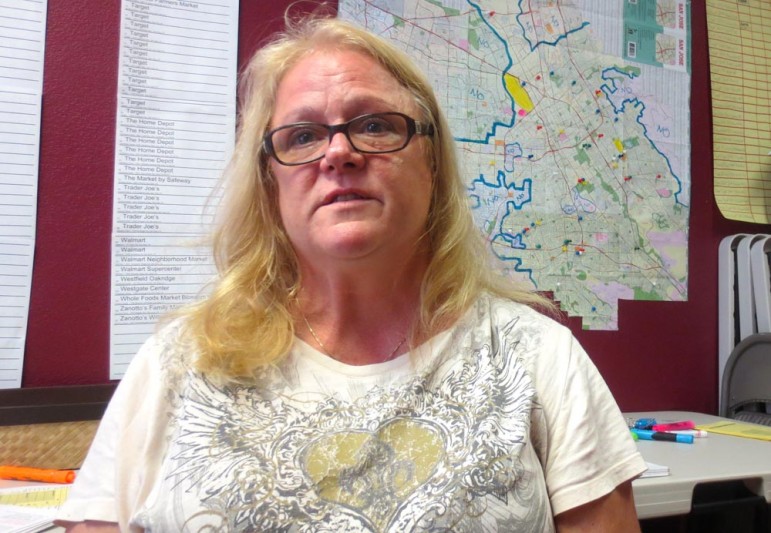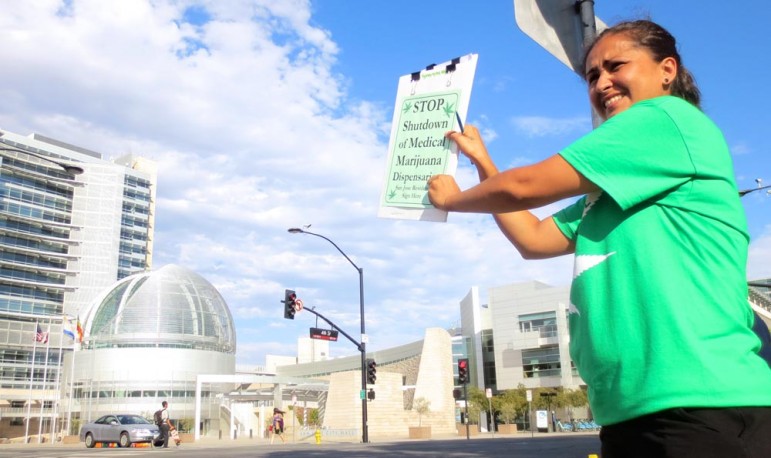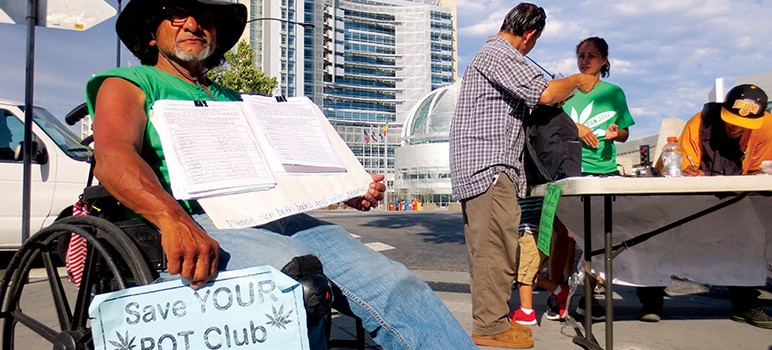They call it the War Room. A cramped burgundy-walled nook tucked to one side of the All-American Cannabis Club. Stacks of signed petitions clutter the tabletops, waiting to be tallied. On one wall hangs a map of San Jose with tacks stuck on sites of some of the busiest medical marijuana clubs. Their membership lists are a goldmine for phone bankers. Virtually all day, every day for the past few weeks, volunteers have filed into the narrow alcove to rally opposition against a city ordinance going into effect July 18.
They say it threatens to close more than 70 collectives in an instant.
“The city wants to shut us down,” says Susan L., 55, a patient advocate who declined to share her last name, she explains, because of the bias against cannabis. “We can’t let them do that.”

Susan L. (last name withheld) lost a brother to lung cancer five years ago. He relied on cannabis to ease the pain of chemotherapy. Now she's a patient advocate and has been volunteering her time counting signatures at All-American Cannabis Club in north San Jose.
The Campbell resident has been logging 12-hour days in the north San Jose collective, numbering autographs and recruiting volunteers to collect more for a pair of petitions to overturn some of those regulations. The effort led by the Silicon Valley Cannabis Coalition needs 100,000 signatures by next week—a longshot.
“We believe in regulations,” says Susan, whose brother relied on cannabis to ease the pain of chemotherapy before he died of cancer five years ago. “We need strong, fair, defensible and compassionate regulations. San Jose seems to have forgotten the ‘fair and compassionate’ part.”
While opponents like Susan call the rules—passed in a 7-3 vote by the City Council last month—an effective ban, the city says it has allowed plenty of leeway for law-abiding clubs.
“We want to allow for medical marijuana, but we don’t want kids to have access and we want safe neighborhoods,” Mayor Chuck Reed tells San Jose Inside. “We’ll have enforcement now, so the ones who want to stay in business will find a way [and do] whatever’s necessary. It should be easier to comply than not to comply. We want to reward people who follow the law.”
And fight those who oppose it.
Reed says he will raise money and wage a war of his own if challengers muster up enough signatures for a referendum. It’s a novel approach—placing an already-codified ordinance on the November ballot to cement it with a vote from the public. The step would protect the rules from changes by future city councils, Reed says. And, more importantly, prove that voters agree with his brand of regulation.
“I have no doubt that the people of San Jose will support what the council has done,” Reed says. “We have a strong and effective system in place.”

Anita Inocencio, whose mom relied on edibles to ease the pain during chemotherapy for lung cancer, stands across from City Hall trying to drum up signatures for a referendum.
That system limits collectives to certain industrial zones, or about 1 percent of the city. It demands all pot be grown in Santa Clara Valley or contiguous counties and requires all edibles and concentrated cannabis products to be made on site. It sets distance requirements of 1,000 feet from schools, 150 feet from homes and 50 feet from each other. All clubs will need 24-hour security, despite business hours being limited from 9am to 9pm.
“Honestly, it’s a de facto ban,” says Sean Donahoe, of the California Cannabis Industry Association, citing an oft-repeated refrain from the industry. “Whether the club is a good or bad actor, the requirements are unworkable.”
The battle highlights the broader quandary facing the state, which legalized cannabis for medical use but has yet to come up with adequate legislation to govern the industry. In the absence of state law, local agencies have taken the lead—some to the hilt, like every other city in Silicon Valley that enacted a full-on ban, emboldened by a 2013 state Supreme Court decision that reinforces municipal zoning rules. Now the county is on track to pass a ban and a state bill making its way through the Assembly would reinforce local law.
Few people seem to know how the San Jose ordinance will play out—not even the city officials in charge of enforcement. No permit fees have been set, though they’re expected any day now, and there’s no clear direction about how or when to involve police if a club remains non-compliant.
The ordinance says that all unpermitted clubs must cease operations by July 18. All-American Cannabis Club owner Dave Hodges takes that to mean that no collectives will have their permit approved that day, meaning every club in the city will have to halt business or risk staying open illegally while their application pends.
When the council came up with regulations in 2012, a referendum canceled the entire ordinance. “A mistake,” Hodges says in hindsight. The current referendum seeks to renege only select parts deemed unworkable by industry groups. If it’s upheld, Hodges says, the new municipal code spells the end for his career in the industry.
“Personally, I’m going to be shutting down if we’re unable to be successful with this referendum,” he says. “Other clubs may try to fight through the legal system, but I’ve been through that and it cost me over two years of stress and $100,000. And that was in a situation that was a lot less clear than we’re seeing right now. Now, it’s pretty clear that the city can shut us down.”
Starting July 18, the city will accept applications from collectives to come up to code. They will be considered on a case-by-case basis. If a club submits an application with an address outside of acceptable zoning, it gets denied. But collectives will have the option of relocating within a 90-day window to come into compliance.
Angelique Gaeta, an assistant city manager, is working on a FAQ page to post online, with links to applications through both the city manager’s office, which governs how a club is run, and the planning department, which governs where a club may set up shop. The city promises a grace period before it sics the cops on anyone. But it’s not expected to be as complacent as it has been with code enforcement to date, and city officials have taken umbrage to the “de facto ban” claim.
“Considering they’re all operating illegally now (by federal law) and we allow them to exist, I’d say that’s not accurate,” Reed says. “We’re talking about hundreds of potential locations.”
By comparison, Oakland has eight collectives, San Francisco a couple dozen and Richmond three. Reed expects dozens of clubs to survive in San Jose.
James Anthony, a cannabis lobbyist, calls that estimate disingenuous. “That’s clearly not enough for a city as big as San Jose,” he says. “The demand is there. Closing all those collectives will only push it back to the black market.”
Monday evening, a couple miles away from the War Room, William Refuerzo III, 63, mans a table kitty-corner from City Hall. He’s been at the intersection since sunrise wearing a green pot-leaf shirt and a camo hat, camped out in his dinged-up wheelchair, collecting signatures and telling passers-by how cannabis gave him better range of motion after a motorcycle wipe-out on Mt. Hamilton crippled his legs.
“I can still barely walk, but at least I can stand,” Refuerzo says, hoisting himself up to prove it. “Doctors said I wasn’t even supposed to do that.”
A cannabis club patient for the past dozen years, he takes issue with the new rules for many of the same reasons as his fellow signature-gatherers—the limits on location and across-the-board changes to cultivation and production. But he also calls the ordinance an invasion of privacy because it asks dispensaries to hand over patients’ names to the city.
“Listen, a lot of us have a personal reason to be out here, asking for support,” Refuerzo says. “That’s one of mine. But I’m here for all those other reasons people bring to the table. I ask people, ‘Where will you get your medicine if your club shuts down?’ They tell me, ‘It’s back to the streets, brother.’"


If you are part of the community who are currently weeping incessantly over Mayor Reed’s and Council’s decision concerning the cannabis club policy, your cries and or prayers on this matter will not be answered any time soon or even at all.
The cannabis loving folken have the right to continue to petition our government for change but, if you persist in challenging Mayor Reed and Council on this issue and how you are currently proceeding to combat the cannabis policy, your cause will likely be first; “crushed” and then “swept into an eternal political abyss” (where you can add “the gnashing of teeth” to your despair).
The cannabis loving folken must find a different method that will garner public support for cannabis related issues.
Good reporting Jenn W.
David S. Wall
David S. Wall you are correct, especially when looking at how horrible Colorado has become, with crime down and revenues up. Instead we should just stay in this phony War on Drugs age, and let criminal gangs distribute instead, while the cannabis hating “folken” continue to complain about a plant that grows naturally. After all, San Jose has no gang problem right? Good thinking.
If anybody could use the medicinal Properties of Cannabis , Its the Mayor for his Alzheimers and City Council for Dementia
Good one, agreed.
San Jose: everyone who has been paying attention knows cannabis is less “addictive” than coffee and FAR less harmful than alcohol and all other prescription-drugs. Just Say No to Chuck Reed’s Propaganda.
Anybody paying attention lately knows that:
1) Cannabis is the best drug to fight cancer, in it’s purified form, ingested or rubbed on skin tumors.
2) The US government supports a ban on cannabis research to bolster 100+ year old pharma companies.
3) Old people run the government lately, and they don’t know anything about cannabis, and don’t care, and don’t care what younger people think, because they don’t have any money.
California will legalize MJ in less than five years. San Jose should be the vanguard in promoting and regulating the industry. Instead local politicians continue to ignore the vast majority of people and cater to the fears of the hypocrites who continue to seek penalties and punishment instead of reasonable policies that will address neighborhood concerns.
The there is the ever popular “kids smoking pot” argument. Keep it illegal and kids will find it more attractive–and once in a while parents ought to check their liquor cabinets, because pot is not the most dangerous drug their kids are using.
Continued proof, that if you disagree with Rufas Reed and his minions in power- he will do whatever he can to harm you. Liccardo, under Rufas’ thumb and direction will continue the policies of poor faith negotiation, faux transparency in government, false information to the public and bullying via the wealthy elite (their friends).
When California voters legalized medicinal marijuana our state legislature, had it possessed an ounce of wisdom or courage, would’ve realized these things:
1 — Medicinal marijuana, as sold to the voters, was a myth. Yes, there existed a small percentage of seriously ill people who might be helped by the weed, but neither the government, health industry, nor people of this state had the requisite ability and integrity to operate such a system. The government, as has been made painfully clear, has no clue how to administer a program that involves offensive drug use and requires the breaking of federal laws. The medical health industry, which will never free itself of charlatans, quacks, and frauds, can offer/enforce no legitimate standards for such treatment. And as for the public, well, is it any surprise its community of substance-abusing losers and burnouts jumped at the chance to abuse the voters’ compassion and get themselves reclassified as patients?
2 — The voters’ decision of medicinal marijuana represented a unique opportunity for the legislature to justify taking a necessary action it had long avoided, that being to decriminalize marijuana. I believe it necessary because enforcement has proven costly, contradictory, ineffective, and, by creating an opportunity for Mexican cartels, dangerously counterproductive.
3 — By decriminalizing marijuana in response to the public’s directive, the legislature would have had the unique opportunity to frame its action as its only option given the impossibility of carrying out the voters’ will as mandated, and demonstrate that reluctance and concern by constructing a special tax (on sales) to fund education, research, and comprehensive drug testing (for those receiving government benefits).
Decriminalized marijuana use may or may not increase slightly the amount of personal damage the drug inflicts on our community (and it’s very harmful to young brains), but it will put an end to the far more serious cultural damage caused by keeping it illegal.
Keep in mind that US doesn’t want to legalize because it’s a great excuse to put people in prison and make them work for slave labor wages, largely substituting for much of the manual labor force the US once had jobs for.. (sigh).
Marijuana prohibition === SLAVERY people.
Simple answer, San Jose boycott. I will not being doing business with San Jose or eating at the restaurants there. And I will be sure to let the owners know it is due to this ruling.